Rohingya children face harsh reality
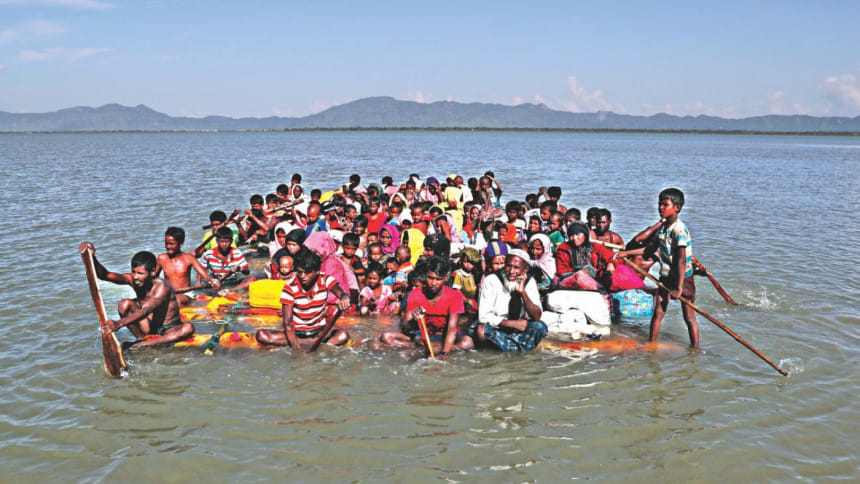
When much of the camp around her is still fast asleep, Radia, 12, wakes up at 5:00am and quickly buries herself in her Quran study. Throughout the day, she spends as much time as she can -- eight to ten hours daily -- memorising the Arabic texts.
"This way, I try not to remember the things I have been through. But it doesn't work all the time," she says, pain etched on her face.
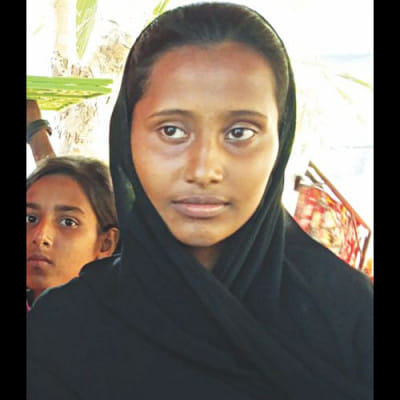
Both her parents were shot and killed by the Myanmar army inside their home at Throngbazar of Busidaung in the Rakhine State as the family was trying to escape the military crackdown in early September.
Amid intense firing, she hid in a nearby hill with some relatives. They came out of the hiding to bury her parents after the army left, said Radia, who reached Cox's Bazar two months ago after trekking through hills and jungles for 12 days.
She is one of the 325 kids -- 171 girls and 154 boys -- now sheltered in the Orphanage for Refugee Rohingya Children in Ukhia's Balukhali Camp-2. Aged between eight and 14, they lost both or either of their parents in the military offensive or do not know where their parents are.
But this is only a tiny fraction of the Rohingya children who have lost their parents, many for ever. In a survey, the social welfare ministry found 36,373 such children in the refugee camps as of November 8.
"We are now verifying the list," said Md Nikaruzzaman, upazila nirbahi officer of Ukhia, adding that it was possible that parents of many of these children were alive but had been separated from their kids while fleeing the violence.
"Parents of some of these children may well be somewhere in the refugee camps," he told The Daily Star yesterday.
RISK OF TRAFFICKING, ABUSE
But finding their parents will not be easy. Many of these children are too young to tell their parents' names or any other particulars. Also, 4.5 lakh of the refugees have been registered biometrically so far -- less than half of nearly one million Rohingyas now living in tents and under tarpaulin sheets in the refugee camps in Cox's Bazar. It is not yet clear how many of the children have lost their patents to the military operation.
At the moment, most of these children are living with their relatives or neighbours or in centres run by aid agencies such as Save the Children.
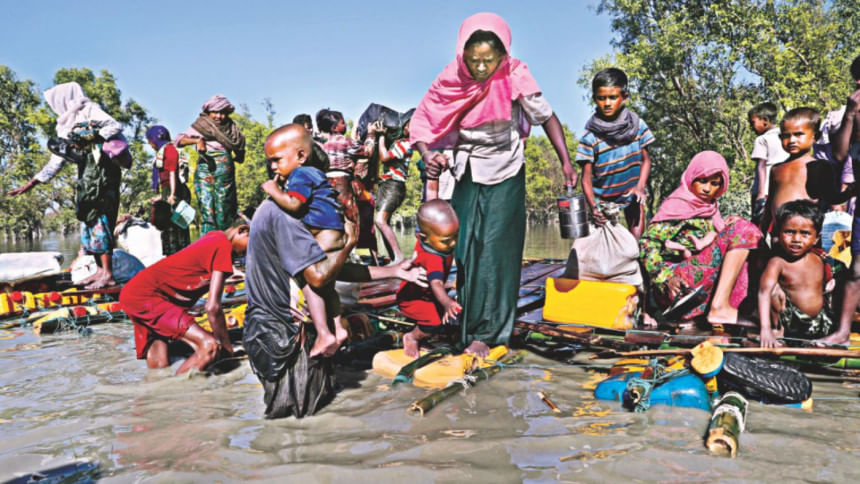
But with so many children living without their parents, aid workers and government officials are worried about trafficking and abuse. They fear that some of these children may also be used to carry drugs, such as yaba tablets smuggled in from Myanmar, inside and outside the camps.
"Such risks are there, but we are alert. After we finalise the list and determine how many kids have lost their parents in the violence, we will decide on how they can be integrated with the Rohingya community. They should not be separated from the society," Refugee Relief and Repatriation Commissioner Md Abul Kalam said.
NO ESCAPING THE PAST
In the orphanage set up by Beximco Pharmaceuticals and managed by Indian charity UNITED SIKHS, Radia talks little and made hardly any friends.
Nafiza Ferdowshi, assistant professor of educational and counselling psychology at Dhaka University, said these were signs of trauma that would have long-term impacts on these children. Some may even start showing the signs five or ten years later.
Radia tries her best to follow the instructions as 10 teachers -- all of whom taught in madrasas in Rakhine until they themselves fled the violence -- take turns to give the children lessons on Quran and Hadith.
But all of this is new to her -- the place, the teachers, neighbours, everything. Back home, she used to go to school with her friends, with whom she would play marbles in the afternoon.
Does she have those marbles with her? She shakes her head. No matter how hard she tries to concentrate on her Quran studies to forget her past, some memories are constant.
She remembers, for example, how she fled for life as her parents lay dead or how hastily she buried them to avoid being seen by the army or the local vigilantes.
Nafiza warned that children like Radia would be in a life-long trauma if they did not get proper care, counselling and protection. Because they are vulnerable, it will be easy to exploit them and they will face problems in family bonding and trusting others.
Because they have seen things such as torture and killing at an early age, they will always be haunted by fear, even if they are safe or have food and shelter, she added. "Scenes of such violence may even appear in their dreams."
Radia is already showing some of these signs. And she has a recurring dream: her parents getting shot as Myanmar burns.
Every time she has this dream, she wakes up, shudders in panic, cries and tries to sleep again.

 For all latest news, follow The Daily Star's Google News channel.
For all latest news, follow The Daily Star's Google News channel. 

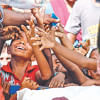

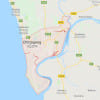




Comments